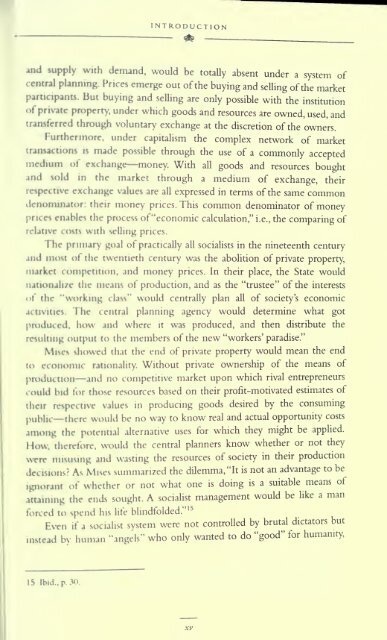Marxism Unmasked from Delusion to Destruction.pdf 7471KB
Marxism Unmasked from Delusion to Destruction.pdf 7471KB
Marxism Unmasked from Delusion to Destruction.pdf 7471KB
Create successful ePaper yourself
Turn your PDF publications into a flip-book with our unique Google optimized e-Paper software.
INTRODUCTION<br />
and supply with demand, would be <strong>to</strong>taUy absent under a system of<br />
central planning. Prices emerge out of the buying and seUmg of the market<br />
participants. But buying and seUing are only possible with the institution<br />
of private property, under which goods and resources are owned, used, and<br />
transferred through voluntary exchange at the discretion of the owners.<br />
Furthermore, under capitalism the complex network of market<br />
transactions is made possible through the use of a commonly accepted<br />
medium of exchange— money With all goods and resources bought<br />
and sold in the market through a medium of exchange, their<br />
respective exchange values are all expressed in terms of the same common<br />
denomina<strong>to</strong>r: their money prices. This common denomina<strong>to</strong>r of money<br />
prices enables the process of"economic calculation," i.e., the comparing of<br />
rebtive costs with selling prices.<br />
The prinury goal of practically all socialists in the nineteenth century<br />
.ind most of the twentieth century was the abolition of private property,<br />
market competition, and money prices. In their place, the State would<br />
nationalize the means of production, and as the "trustee" of the interests<br />
of the "wtjrking class" would centrally plan all of society's economic<br />
activities. The central planning agency would determine what got<br />
produced, how and where it was produced, and then distribute the<br />
resulting output <strong>to</strong> the members of the new "workers' paradise."<br />
Mises showed that the end of private property would mean the end<br />
<strong>to</strong> economic rationality. Without private ownership of the means of<br />
production— and no competitive market upon which rival entrepreneurs<br />
could bid for those resources based on their profit-motivated estimates of<br />
their respective values in producing goods desired by the consuming<br />
pul,l,c—there would be no way <strong>to</strong> know real and actual opportunity costs<br />
among the potential alternative uses for which they might be applied.<br />
How. therefore, would the central planners know whether or not they<br />
were nususing and wasting the resources of society in their production<br />
decisions? As Mises summarized the dilemma, "It is not an advantage <strong>to</strong> be<br />
ignorant of whether or not what one is doing is a suitable means of<br />
attaining the ends sought. A socialist management would be like a man<br />
forced <strong>to</strong> spend his life blindfolded."'^<br />
Even if a socialist system were not controlled by brutal dicta<strong>to</strong>rs but<br />
instead by human "angels" who only wanted <strong>to</strong> do "good" for humanity.<br />
15 Ibid., p. 30.
















